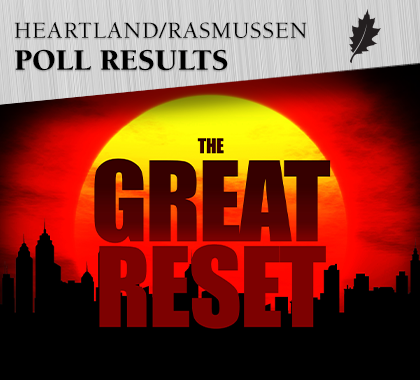Only 32% of voters have a favorable view of the Great Reset movement
45% of voters favor a law that would protect American companies from having to comply with a European ESG scoring system; Only 29% oppose
41% of voters favor law that would stop publicly traded banks, financial institutions and investment managers from generating ESG scores for individuals and businesses who have not explicitly asked to be rated; Only 32% oppose
ARLINGTON HEIGHTS, IL (May 16, 2022) – Since the onset of the COVID-19 pandemic, the World Economic Forum and several other globalist institutions have been calling for a “Great Rest” of shareholder capitalism and the implementation of environmental, social, and governance (ESG) scores to push their “stakeholder capitalism” agenda.
A new poll by The Heartland Institute and Rasmussen Reports indicates that most likely voters oppose both the Great Reset and the implementation of ESG scores for businesses and individuals in the United States. Among Republican voters, a whopping 67% “strongly oppose” the Great Reset. Similarly, a solid majority of Independents (57%) “strongly oppose” the World Economic Forum’s Great Reset movement. On the flip side, 34% of Democrats “strongly favor” the Great Reset. Interestingly, Republican and Independent voters tend to be more “familiar” with the Great Reset movement compared to their Democratic counterparts.
ESG Awareness
As of now, only a small fraction of likely voters are “very familiar” with ESG scores, a key component of the Great Reset movement. As can be expected, those with higher incomes, especially likely voters with incomes exceeding $200,000 per year, are more familiar with ESG scores than those on the lower end of the income spectrum. It is also true that young Americans are more familiar with ESG scores than older Americans, as are those who self-identify as “conservative.”
ESG Favorability
Among all likely voters, a solid plurality opposes the implementation of ESG scores in general. However, when the question is narrowed to those who are “very familiar” with ESG scores, the percentage of likely voters who oppose ESG scores is considerably higher. For instance, 21% of all likely voters “strongly favor” and 17% “somewhat favor” a law that would “stop publicly traded investment managers from using ESG scores to influence other corporations.” But, among likely voters who are “somewhat and/or very familiar” with ESG scores, these figures increase to 32% and 22%, respectively. As the crosstabs data show in great detail, this trend of the more voters know about ESG scores, the more likely they are to oppose ESG scores, is consistent across the poll.
See the poll questions and the crosstabs here.
The Heartland Institute is a national nonprofit organization founded in 1984 and headquartered in Arlington Heights, Illinois. Its mission is to discover, develop, and promote free-market solutions to social and economic problems.
If you’d like to interview a Heartland Institute expert on this topic or other topics, please contact Justin Haskins, the director of Heartland’s Socialism Research Center and primary author of the Heartland/Rasmussen survey, at [email protected], or contact Vice President and Director of Communications Jim Lakely at [email protected].
National Survey of 1,004 Likely Voters on the Great Reset and ESG Scores
Conducted April 28 – May 2, 2022
By The Heartland Institute and Rasmussen Reports
Are you familiar with the Great Reset movement, a global economic strategy in response to the COVID-19 pandemic that seeks to change the priorities of capitalism?
40% yes
38% no
22% not sure
Asked of 402 people who are familiar with the Great Reset:
Do you strongly favor, somewhat favor, somewhat oppose or strongly oppose the Great Reset movement?
16% strongly favor
16% somewhat favor
12% somewhat oppose
49% strongly oppose
7% not sure
Asked of all:
Environmental, social, and governance scores – commonly called ESG – are a kind of social credit scoring system used by financial institutions, investors, and some governments. How familiar are you with ESG scores?
16% very familiar
28% somewhat familiar
34% not very familiar
18% not at all familiar
4% not sure
Many publicly traded investment managers like BlackRock and Vanguard use these non-financial ESG scores to influence corporations to change their policies, products, and business practices. Do you support or oppose this practice?
11% strongly support
18% somewhat support
16% somewhat oppose
27% strongly oppose
27% you are not sure
Would you strongly favor, somewhat favor, somewhat oppose or strongly oppose a law that would stop publicly traded investment managers from using ESG scores to influence other corporations?
21% strongly favor
17% somewhat favor
16% somewhat oppose
15% strongly oppose
31% not sure
Would you strongly favor, somewhat favor, somewhat oppose or strongly oppose a law that would stop financial institutions like banks from using ESG scores when evaluating individuals and businesses applying for financial services like loans?
22% strongly favor
19% somewhat favor
14% somewhat oppose
16% strongly oppose
29% not sure
Some investment management services and banks have started to apply ESG scores to individual banking and investment accounts. Would you strongly favor, somewhat favor, somewhat oppose or strongly oppose a law that would stop publicly traded banks, financial institutions and investment managers from generating ESG scores for individuals and businesses who have not explicitly asked to be rated?
25% strongly favor
16% somewhat favor
15% somewhat oppose
17% strongly oppose
28% not sure
A public pension is a taxpayer-funded retirement system for people who used to work for a government agency, such as the Postal Service or fire department. Some public pension managers use taxpayer-funded public pensions to advance ESG goals. Would you strongly favor, somewhat favor, somewhat oppose or strongly oppose a law that would stop taxpayer-funded public pensions from using ESG scores when evaluation potential investment opportunities.
27% strongly favor
15% somewhat favor
14% somewhat oppose
18% strongly oppose
26% not sure
The European Union is considering legislation that would make ESG scores mandatory for many companies that operate in Europe or do business with European companies, including American businesses. Would you strongly favor, somewhat favor, somewhat oppose or strongly oppose legislation that would protect American companies from being required to comply with a European ESG scoring system?
28% strongly favor
17% somewhat favor
14% somewhat oppose
15% strongly oppose
26% not sure
NOTE: Margin of Sampling Error, +/- 3 percentage points with a 95% level of confidence
###







